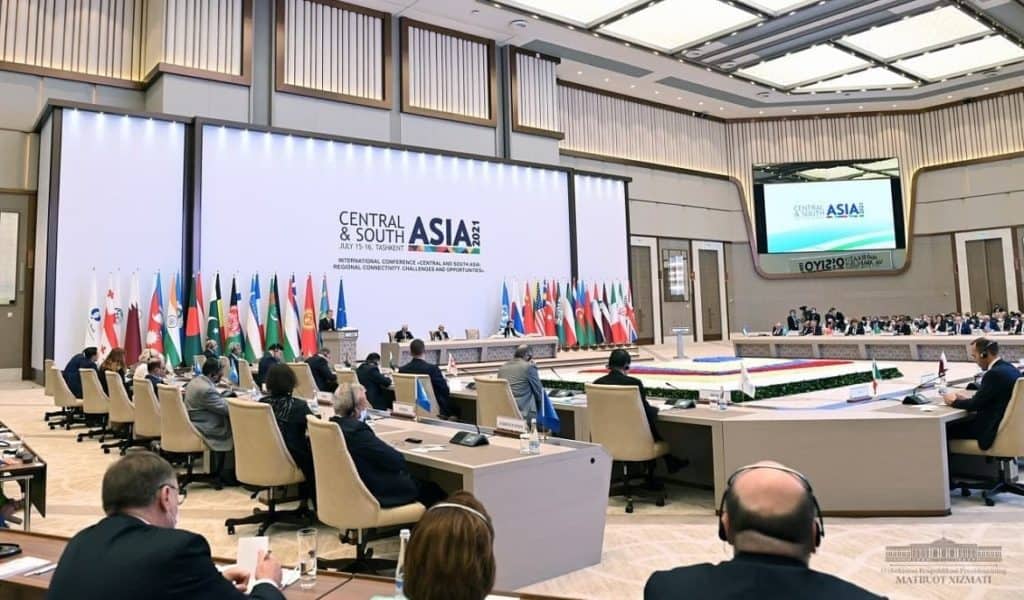By Anton Evstratov
The conference “Central and South Asia: Regional Interconnectedness. Challenges and Opportunities,” instead of the declared search for integration and inter-regional cooperation, once again demonstrated the principal contradictions of its participants.

The major international forum, held under the auspices of the United Nations in the capital of Uzbekistan, brought together more than 600 guests representing about four dozen regional states and world powers. The delegates discussed political, military and humanitarian, as well as technical and economic issues of establishing cooperation from the Caspian Sea to Bengal. Nevertheless, security and specifically the situation in Afghanistan turned out to be the main agenda of the forum. This is easy to explain, since the Islamic Republic, despite its low level of economic development and low value as a trade partner, due to its location, is a key state that connects Central and East Asia and in this respect is necessary for both regions to build any serious cooperation.
Security on the territory of Afghanistan and predictability of its political and economic development as well as its ethno-political and social situation is vital for any format of cooperation of the Central and South Asian states.
At the same time, after the US announced the withdrawal of its last ground military contingents from Afghanistan, all these issues are open. The military confrontation between the Taliban, who already controlled most of the country, and the government troops has intensified again. And, by and large, the situation in recent days is not developing in favor of official Kabul – its army left a number of areas, lost several hundred soldiers and even high-ranking officers.
Even before the conference, Elizabeth Sherwood-Randall, the U.S. president’s adviser on homeland security, met with the foreign ministers of the Central Asian countries to discuss the Afghan settlement. Their talks resulted in a surprise for the rest of the attendees at the conference, “Central and South Asia: Regional Interconnectedness. Challenges and Opportunities,” on the sidelines of the conference, the announcement of a new consultative platform comprising the United States, Afghanistan, Pakistan and Uzbekistan.
The news angered, first and foremost, the Russian side and promptly elicited angry comments from a range of regional experts representing Russia and its interests. The decision by the United States and its Central Asian partners may be the latest attempt by Washington, with a minimum investment of resources and in the context of its withdrawal from Afghanistan, to remain the most influential player on its territory. This is undoubtedly contrary to the interests of Moscow, which is ready for military-political domination in the vacuum that has opened up while economically balancing with Beijing.
The new pro-American platform also cannot please Iran, which, on the one hand, supports Russia in the current circumstances and, on the other hand, is itself ready to ensure an intra-Afghan settlement. The talks between the Taliban and the Afghan government were held on July 7 in Tehran. The details and outcome of these consultations were not reported.
Iran is not against repeating the Iraqi scenario after the annihilation of Saddam Hussein’s regime by the Americans and becoming, as in Iraq, the dominant power in Afghanistan, especially in its Shiite-populated areas. Iran has long had the necessary tools to do this – the Fatimiyoun units that Tehran has already tried out in Syria, the Afghan religious and intellectual elite brought up in Iranian religious centers, the established social and economic ties with Afghanistan’s border territories (in particular, millions of Afghan refugees and workers in the IRI).
The preservation of the U.S. as a serious politico-military factor in Afghanistan could not be beneficial for China as well, which also has its own views on the republic – primarily on the basis of its logistical capabilities. U.S. control over this part of Beijing’s “One Belt, One Road” project.
We should also note the reciprocal nature of the American initiative – just a day before it, at a meeting of SCO foreign ministers in Dushanbe, the issue of Iran’s admission to the organization was raised again, whose application, as the forum participants put it, “has been on the table for a long time.
At the same time, one should not overestimate the importance of the Washington-Tashkent-Islamabad-Kabul format, since it is declared “consultative”. Besides, the US leaving Afghanistan has practically no direct tools to influence the situation in the country, and the available opportunities of other participants of the format do not increase in any way with the beginning of its work.
In this situation, it is impossible not to note the seemingly increasing importance of Uzbekistan as a moderator of the situation in Afghanistan. Tashkent acts here as a formal equal partner of the nuclear powers – the United States and Pakistan, which in terms of image enhances its status. At the same time, it is obvious that Uzbekistan occupies a clearly subordinate position in relation to the United States, which, on the one hand, hides its additional voice in the new format, and on the other, uses Uzbek leverage in Afghanistan. The latter concern the Uzbek minority, whose leader, Marshal Rashid Dustum, can significantly balance the Taliban’s position in the new Afghan realities and contribute to strengthening the position of official Kabul.
However, the real counteraction to Taliban is possible only through consolidation of all non-Taliban forces of Afghanistan – that is, by involving pro-Iranian Fatimiyun, as well as Gulbeddin Hekmatyar’s Islamic Party of Afghanistan, allied to Turkey. The possibility of cooperation with the latter is the reason why the Americans transferred some facilities to their NATO allies in Turkey. Nevertheless, this is an extremely dangerous game fraught with the risk of Ankara getting dragged into the war in Afghanistan, which in turn can hardly be successful in it only with Hekmatyar, not the strongest and most popular politician of the Islamic republic. For its part, the U.S. is not ready for consolidation with him and pro-Iranian forces.
However, this is not the end of the contradictions around Afghanistan. At the meeting, President Ashraf Ghani accused Pakistan’s Foreign Minister Imran Khan of supporting the Taliban. Although the minister rejected the accusation and even held talks with Ghani afterward, that did not keep Ghani from consulting with the foreign minister of India, Pakistan’s main regional adversary. It should be noted that New Delhi is extremely interested in stabilizing Afghanistan, because its economic initiatives within the framework of the North-South corridor and the alignment of any economic and logistical cooperation with Central Asian countries, Iran and Russia depend on it. Meanwhile, India’s relations with Pakistan are still tense. For example, the foreign ministers of these countries did not shake hands during the official opening ceremony of the conference in Tashkent. The Afghan government, on the other hand, which was abandoned by the US, seems eager to accept any form of Indian assistance, on any terms, seeing it as perhaps the only chance not to be hit by the Taliban. New Delhi, for its part, would also benefit greatly from a reinforcement in Afghanistan – because by doing so it would enter the traditional “fiefdom” of its main adversary. With India’s good relations with the United States and a serious increase in its military and political capabilities, this scenario, though bold, is realistic.
Thus, it is obvious that Afghanistan is still the main topic of any discussion of the problems of interaction between the countries of South and Central Asia, occupying a key position between these regions. As for the Tashkent forum, despite the most serious representation, it has failed to at least blunt the contradictions of the main external and internal operators of the Afghan settlement. In the absence of consolidation of forces opposing the Taliban or not belonging to them, it is hardly possible to speak of successful opposition to them. The current bleak situation for official Kabul was indirectly illustrated by the beginning of negotiations with the Taliban in Qatar’s Doha, where the Afghan government delegation headed by Dr. A. Abdullah went.
Author: Anton Evstratov (Russian historian, journalist and journalist living in Armenia, lecturer at the Department of General History and Foreign Regional Studies at the Russian-Armenian University in Yerevan).
(The views expressed in this article belong only to the author and do not necessarily reflect the views of World Geostrategic Insights).







